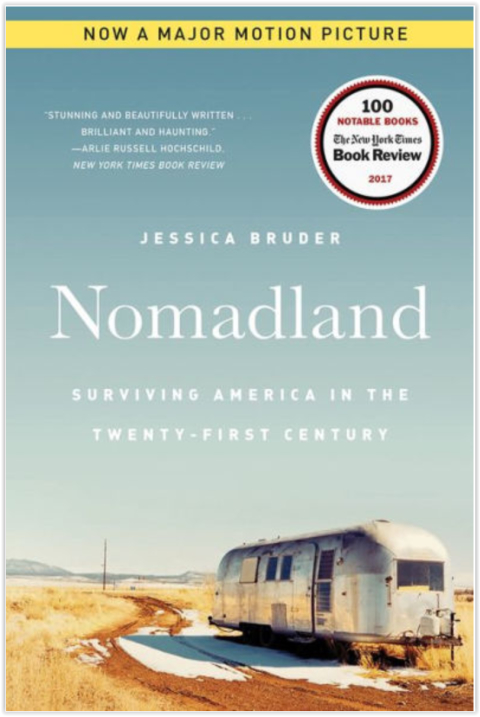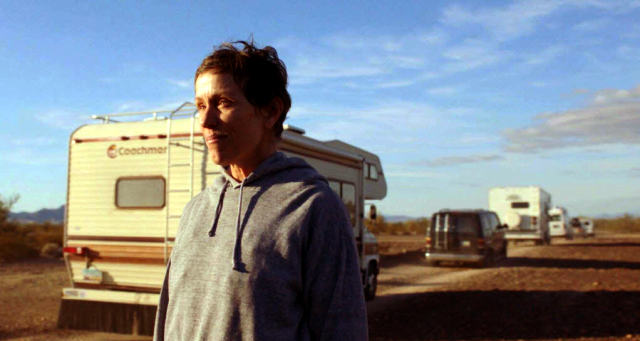
I wasn't far into this book before I was enticed by the concept of modern nomads. Jessica Bruder, a long-time journalist, follows the lives of a few, and I found their stories compelling.
As any good journalist does – she digs deep into subject matter that needs background for context. Those excerpts are somewhat dense, but read on. You'll learn about some truly resilient – and in my opinion - inspiring people.
Who are they?
Nomadland follows the growing number of former homeowners that have lost their house, property, job and other income. With nowhere to turn they have taken to the RV as their new “wheel estate”. Seasonal work has become their new career.
This multiyear story follows their migration across the nation: Amazon warehouses in early winter, harvest work in spring and campground hosts in the summer among other places and types of work.
Many of these are fairly horrible jobs. You get worked hard and you get little pay. Of course, those trying to fill these positions advertise just the opposite.
"From a distance, many of them could be mistaken for carefree retired RVers. On occasions when they treat themselves to a movie or dinner at a restaurant, they blend in with the crowd."
- A passage from Nomadland.
Typically, we'd want to hear some glaring mistakes they’ve made to find themselves in such circumstances. Some fault of their own. I mean, come on, you’ve really got to stumble badly in life to get to this point, right?
Of course, there are a few that have done just that. But most have not and are more likely to have succumbed to absurdities that we're all too familiar: The suffering cost of health care. The evils of divorce proceedings. Student debt, along with the fundamental rule of public corporations: Profits over People. Or the onslaught of a pandemic.
Sometimes when you play by the rules you still get screwed. Bruder points out how this happens all too easily. Couples, singles and divorcees. Profile after profile, she goes through them all, detailing their fall from house, income and savings.
I think it was at this point my mouth began to get dry. Holy crap, I began to get anxious about our own situation.
Could a major health problem wipe us out? Could we survive a housing crash, economic collapse or an extended layoff? Should we Craigslist a van to have at the ready, just in case? Will we end up in said van down by the river?
You can't help but wonder - at least for a moment - if this could happen to you.
Allow me to defend my momentary bout of anxiety. Aren't we are living in an ever-changing landscape - shaped by a fragile and whipsaw economy, climate breakdown, and more recently - anger politics? Doesn't it sometimes seem it's all a rickety house of cards perched on the precipice?
But don’t panic. You’ll feel good after reading this. I did.
"As I write, it is autumn. Soon winter will come. Routine layoffs will start at the seasonal jobs. The nomads will pack up camp and return to their real home - the road - moving like blood cells through the veins of the country. They'll set out in search of friends and family, or just a place that's warm."
- A passage from Nomadland.
Thankfully, it's not all gloom and misery. Amazing grace comes with the comradery and selflessness among the travelling workers.
Typical Americans these days are more self-indulgent, individualistic, and selfish then ever. You'd figure this would carry over among the nomads.
Well, these Americans have been humbled down to the core. Some have descended from a very high social status – and compassion and good-will abound.
You need help with your RV? You'll get it. You'll be offered extra food. Hot coffee flows from every rig. Got your mug? Or just need a hug?
Come spring they gather in the Arizona desert from all over. There are thousands. Most are there to learn tips and tricks of the road. A few are there to give presentations. How to stay hygienic while living in a van - pooping in a bucket is a favorite seminar for newbies. Where to park overnight without getting hassled. Where to get a hot shower. And the latest topic: How to outfit your rolling home with lots of solar and battery power.
Not surprising, either, are the friendships that are made along the way. These bonds form tight from shared shifts at the warehouse, or long convoys across the west. Some partner up for the long term. Or for life.
“There’s no clear count of how many people live nomadically in America. Full-time travelers are a demographer’s nightmare. Statistically they blend in with the rest of the population, since the law requires them to maintain fixed – in other words, fake – addresses.”
-A passage from Nomadland.
Another realization is how inexpensive and uncomplicated it to get good eye care, dental work (and some other general health care) just south of the border. Nomads flock to Mexico to very familiar looking professional buildings filled with neatly dressed medical staff on quality with anything you’d find in your own town. But the big difference is the cost is roughly 70% less.
But make no mistake. This is a privileged, mostly white, mostly middle-class, mostly retirement-age phenomenon. Immigrants from South America who migrate following our harvests of crops would be thrilled to afford an RV or van – and to live in their own quarters during their seasonal work.
I'll suggest that we're finally examining this lifestyle since its not just undocumented migrants moving across the country doing hard labor. Things grab our attention when it’s our own U.S. citizens who have fallen from the American Dream of 2 cars in the garage and a white picket fence.
But they’ve discovered an avenue forward, outside societies expectations of what is considered a ‘normal American life’ – while the rest of us toil away in fluorescent caves -working to make our monthly payments. Sometimes it seems that our path isn’t much better – when our positions can be sliced away with no warning or reason. Sometimes it feels like we should just join the nomads and get it over with.
This movement has been steadily growing, as our economy rings out more unfortunates that have spun out to the margins. But after the explosion of the book (then the film - it won Best Picture for 2020) it’s sure to explode further.
Nomad life is getting legit and going mainstream. And with the ridiculous cost of housing, it may look like a tempting option for the younger generation.
Which isn’t anything to celebrate.
This is a hard and tiring life. Very few thrive. Most merely survive. Some simply disappear. Rigs won’t last forever, and bodies aren’t getting any younger.
The lucky ones scrape and claw their way back to a permanent residence (perhaps a small plot of land or a rental) along with some modest income.
"They wash their clothes at laundromats and join fitness clubs to use the showers. To keep their gas tanks and bellies full, they work long hours at hard physical jobs. In a time of flat wages and rising housing costs, they have unshackled themselves from rent and mortgages as a way to get by. They are surviving America."
– A passage from Nomadland.
As for the author, Jessica Bruder is an excellent writer. But her book has extra magic since she did the difficult things required to embed herself for 3 years among the nomads.
She worked at an Amazon warehouse - which you’ll learn is physically demanding and management can be cruel. She paid her dues at the Sugar Beet harvest, probably the most dangerous job outside a carnival worker. Most everyone that works there gets injured one way or another.
She bought, fixed-up and lived in her own (used) van. She drove and drove and drove - alone - across the prairies and plains to the next place to set up camp and start the next job. She collapsed into her tiny space after exhausting 12-hour days, and in the book, it really shows. She gets the details that bring the authenticity to the surface.
As for the movie, it's very good, but different. The book was better, they always are, but the movie is worth watching. There's some wicked photography and some scenes filmed inside a real Amazon warehouse. There’s also Francis McDormand - come on, she’s just amazing.

But the book is what change my perspective.
I’ve been noticing more RV’s and vans parked in our foothills. Down where the chaparral grows thick along Big T creek. Not the permanent looking ones, usually signified by a tattered tarp covering the roof and windshield.
These are temporary, fresh off the interstate decorated with bug splatter and road grime.
Some are fancy, others are rusty and lean off kilter. They’re around for a while, then gone, then others appear. They’ve found a place to park without getting hassled.
Most locals cast them as no different from all the other homeless, vagrants, thieves, grifters and addicts. At one time I was prone to that idea. But since our homeless problem includes so many working parents and school kids, my attitudes have softened towards them all.
When I spot their rigs, I am more curious than anxious. More empathetic than hard-nosed.
The permanent homeless squat in the same space until forced out. Nomads just need a good night's sleep or a few days from the long drive until its time move on.
I bike past and silently wish them well as I head towards home.
- - - - - - -
If this has piqued your interests, check out the following:
On the road, and online: How the people that inspired “Nomadland” make a living | PBS NewsHour
Nomadland (2020) - IMDb